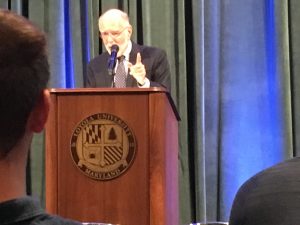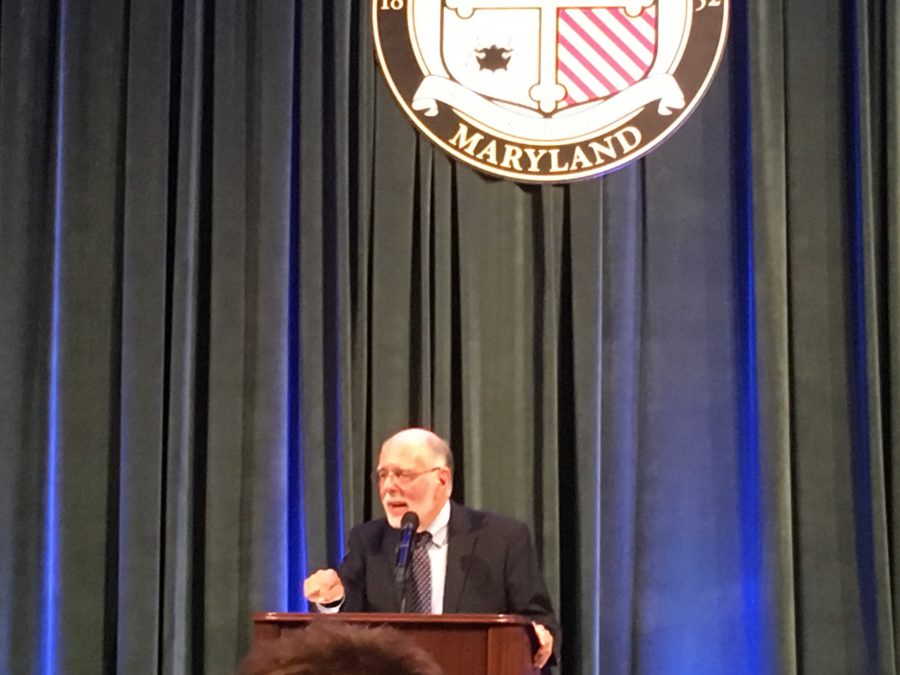Richard Hughes lived through the civil rights movement but did not grasp its meaning until much later in life.
“I was a very privileged college student. I was living in a bubble we call the American Dream,” Hughes said.
On Wednesday afternoon, the author and distinguished professor emeritus from Pepperdine University gave his analysis of Dr. Martin Luther King Jr.’s “Letter From A Birmingham Jail” and shared a message of encouragement to students in McGuire Hall.
Hughes also gave observations from his newest book, “Myths America Lives By: White Supremacy and The Stories That Give Us Meaning.” This lecture is part of a series of Common Text events being held at Loyola this semester. The theology department chose Dr. King’s famous letter as this year’s Common Text to be covered in all Theology 201 classes.
Hughes began the lecture by acknowledging the indifferent attitude many white Americans had during the civil rights movement. He cited Dr. King as being at the forefront of addressing these issues. 
“He wanted us to understand why oppressed people could not wait for a more convenient day to claim their God-given rights,” Hughes said.
He then explained how Dr. King tried to appeal to the Christianity of white Americans.
“King wanted his readers to grasp the truth that the freedom movement was a profoundly Christian project,” Hughes said.
Hughes then went on to explain white Christians’ issues with civil rights movements. Much of it concerned their religious beliefs and teachings.
“Many Christians in the United States turned Jesus’ vision upside down.” He explained how Christians were told to care for others, but they did not lend the same help to African-Americans.
Hughes discussed how Dr. King and his contemporaries were often told to wait by some white Christians. They were told that their movements came at the wrong time.
“People like me were so lost in the American dream that we had no ability to understand the reality of racial oppression,” Hughes said.
Hughes addressed how Dr. King’s problems are still experienced by African Americans in the modern United States.
“Millions of Americans still refuse to acknowledge the truths that King tried so hard to explain,” Hughes said.
In order to explore the religious connection further, Hughes discussed three famous Bible verses, including the golden rule. He explained how the roots of white supremacy began hundreds of years ago with the European slave trade.
“On the subject of race, the Christian Church has been bearing false witness for some 600 years,” Hughes said.
He further explored how early writings on the slave trade created “racist stories that transformed vice into virtue.”
Hughes summed up this history saying, “We have lied to ourselves and to the world about the pervasive reality of white supremacy.”
In his concluding remarks, Hughes was encouraging to the young crowd: “Listen to others, especially those who are least like us in terms of privilege and opportunity.”
He stressed the timeliness and relevance of Dr. King’s topics in our modern world.
“Our nation is in crisis, and much of the burden for addressing this crisis rests on privileged people,” he said.
In Hughes’ mind, now is the time for young people to act on behalf of others.
“The alternative is a world mired in oppression and injustice. Is that the kind of world you want?” Hughes said. “We look to you to make the difference.”
The next Common Text event will be on Monday, Oct. 15 in the 4th Floor Program Room when Messina hosts Magdalena Zaborwoska, Ph.D., a James Baldwin Scholar.















































































































